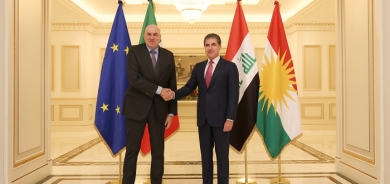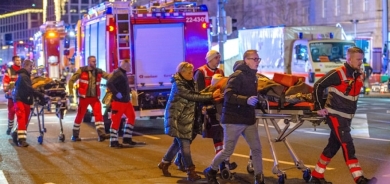Anne F. Pomeroy to Gulan Magazine:The solidarity of people is extremely important and taking care of one another to be able to move through that kind of difficulties that arise upon the basis
March 17, 2012
Exclusive Interviews

Anne F. Pomeroy is Associate Professor of Philosophy and Religion, Vice-President of the Stockton Federation of Teachers, Co-Coordinator of the Radical Philosophy Association. Her primary areas of philosophical concern and interest are social and political philosophies, dialectics, and existentialism. The Professor Pomeroy specializes in the philosophies of Karl Marx, Jean-Paul Sartre, and Alfred North Whitehead and has authored the book, Marx and Whitehead: Process, Dialectics, and the Critique of Capitalism. We contacted the Professor Pomeroy to discuss revolutions and the capacity of the individuals, and she replied to our questions in an exclusive interview to Gulan Magazine as the following:* Revolution is the reflection of abilities of a nation which unites in a specific time period and no any power can resist it so what are the factors affecting the unification of abilities of a nation at once?
- I believe that revolutionary activity is enhanced by a mutual respect, by communication between the people who are conducting revolutionary activity, by “a genuine love” for one another and for human flourishing. I think revolutions take place because people feel that they can no longer flourish as being, that they no longer have the capacity to the powers around them that are so impeding, they are decency and quality of life, but there is no other option. What I think; build the basis of the capacity to actually conduct revolution in a way that is successful, is its motivated a great deal more by the love that people have for one another and by the hatred they have for a political enemy. And that way, on the other side of the revolution; there is solidarity that has been built that cannot be resist.
* What is the most distinguished example that you got in your mind for the revolution?
- Most immediately, we think of the revolutions of the Arab Spring. But here in America also I think of the revolution formed our country which we often forget about, Americans often forgets that this country was founded on a revolution. And that was a revolution desired to be out underneath the power of the British Empire and for people to be self-determinant. I also think of the revolutions now immediately of the revolutions of the Arab Spring, particularly in Tunisia where a great move to began, and where you saw people again coming together to take care of one another in the midst of the revolution, because revolution is extraordinarily difficult, it is not people; it is upheaval, it presents some kind of difficulties. So; to why are we saying before the solidarity of the people is extremely important and taking care of one another to be able to move through that kinds of difficulties that arise upon the basis of revolutionary activity.
* Revolutions for rescuing a nation are much deferent from a revolution for social reforms, so to what extend revolutions of an oppressed nation is the beginning of the freedom for them?
- We have unusual freedom here. But; to what extent is it the begging of a new freedom? I think in some way I tried to answer that in a previous question. I absolutely believe that what needs to motivate the revolution is the care of people for one another, in this way they will insure one another’s security, one another’s freedom, one another’s social flourishing. And that is what I think enable success coming out of the revolution to really a turning way of a certain form of the with one another and relations with one another, economic relations, political relations and social relations and they real turning toward something that is new, because after all that’s meaning of the world it’s a turning around and the people cannot conduct the revolution on the basis of their rejection alone, they must conduct a revolution on the basis of the desire to build something that makes everyone capable of living a decent and a flourishing one.
* After the oppressed nations get their independency you see that they have problems in managing freedoms. What are your views in this regard?
- This is one of the biggest problems in the political theory. To what extend do you already need a grounding of people capable of building what is become before you actually have revolution? And what we know is “a chicken and egg problem”, do you need a population that already understand the responsibility and discuss what is necessary in order to build a real freedom? And to what extend you need that had of time? And to what extend that already unhampered by the previous government or the previous social form or previous political form or previous economic form? Where you have a widely systematically undereducated or systematically impoverished popular, this becomes more difficult and then you required a greater leadership, but I don’t think there is a single answer to any of these in a minute, I don’t think that there is a single answer, because every nation has dealing with its own population, its own people and its own capacity and its own reality on the ground. How many people need to be fed? How much infrastructures need to be built? How many people need to be educated? Every revolution is an opening into a different situation and those must be oppressed certainly individuals.
* After any revolution the nation has to restart the rebuilding process, how is it possible to do that to and what extend revolution can be a factor for enhancing that?
- The conditions that motivate a revolution, it is not something that is imposed by a leadership from the outside, which I think sometimes happened and usually does not proceed well, which is why I think it is one of the essential conditions; is that the people is that a ground swelling from the population but it comes up through the people. That in another self that kind of solidarity that is built that revolution, when people stand together symbolically with their hands joined this is desire for something better than what they have this is the motivation that also were to build what comes next but it has to come given that situation given those people at that time at that in other words how do we build is again a very individual question, but the question is what makes it possible for that building to take place? I would say again the genuine care of the people for one another that motivated revolution at the first place, when you are involve in what happens, when you come through revolutions and immediately everybody gets involved in the exact same cries of power struggle, this going to be on top this is the greatly one of the very fundamental in the meaning of democracy is the desire is that people listen to one another attend to one another’s need and you do not immediately say OK.
* Last Question: If the revolution is for freedom then it should be followed by democracy and development process, to what extend revolutions are factor for the success of the democracy and development processes?
- I sound like a broken record because I would say the exact same things to the extends of the democratic spirit the spirit of the demos the spirit of the people whose the motivation behind the revolution at the first place to exactly that extend will the democracy be thing goes out of it when you said a revolution cannot be motivated by the hatred of the extends form of governments alone it must be further motivated by genuine a hope for building for building future together and that is the democratic spirit and that is the spirit of the people for the people by the people and of the people and that is not a new clean process it’s a very difficult it’s probably the most difficult process and it means making people capable of taking on responsibilities of citizenship and it means giving people opportunities of take on responsibilities of citizenship and of satisfaction in political and organizational process and this is not easy but it’s not impossible either and I don’t think that the question about whether democracy is out of revolution so much dependent upon whether actually democratic spirit motivated revolution and so that the so that it means the end already in some sense be build and we all know there is successful revolutions there is revolution that created situation that are just highly problematic and I believe on that basis you can judge something about initial motivation in the matter in which conducted.
Transcription: Mahmud Samih















